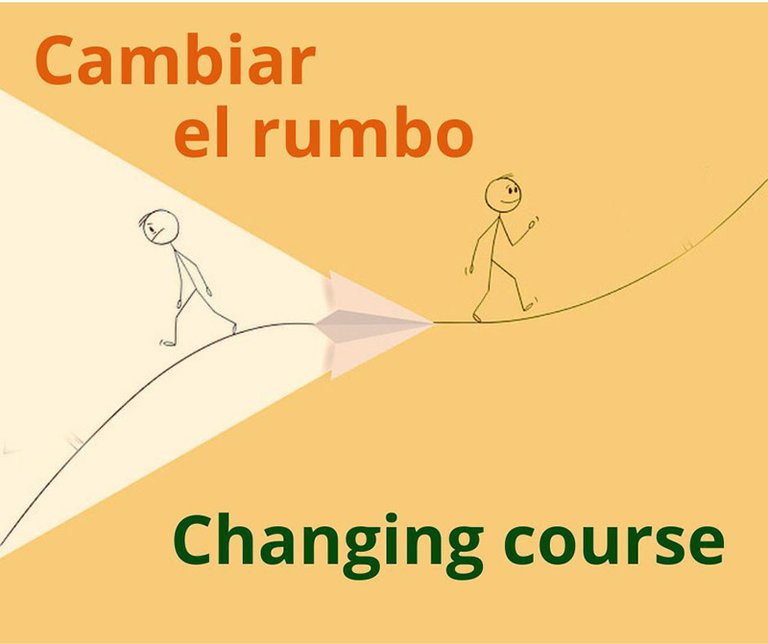
Es interesante darse cuenta como nuestro cerebro va tejiendo redes y conectando un conocimiento con otro, por ejemplo, estás leyendo un libro y el autor hace una afirmación que no cuadra contigo, te hace ruido, dejándote una inquietud donde cuestionas lo que te está diciendo, terminas por negarlo, pero te sigues preguntando: ¿Será como esta persona dice?
También ocurre que en otra lectura, una frase, en boca de uno de los personajes, resuena contigo, comienzas a firmar con la cabeza, te detienes en la lectura y te dices: Es verdad, pienso que así es.
Entonces es cuando viene lo interesante, los dos autores presentan la misma premisa pero con un enfoque distinto, y me sigo preguntando: ¿qué hace que acepte uno y rechace el otro? La respuesta la encuentro en que el primer autor me habla desde la razón y lo práctico y el segundo desde lo emocional-afectivo. Los pongo en contexto para explicarme.
Hace como diez años leí el libro MBA Personal (Maestría en Administración de Negocios) de Josh Kaufman, para ese momento el libro era un bestseller, los que estábamos profundizando en temas de emprendimiento era una lectura obligada, pues de manera muy fresca el autor hablaba de los conceptos y fundamentos del emprendimiento con ejemplos concretos que nos ayudaban a pulir la teoría.
Todo iba muy bien hasta que, palabras más y palabras menos, afirmó: si tu emprendimiento, negocio después de tres meses no está dando los resultados esperados, ese no es, cámbialo. ¡Horror! Y que pasó con aquello de tus sueños, de lo que te gusta y te llena hacer, de tus talentos, de tu ikigai, de la persistencia, la paciencia, el esfuerzo y de mil cosas más de las tantas que hacen que tu emprendimiento este íntimamente conectado con tu propósito de vida.
Hay un gran detalle, Kaufman, habla desde la rentabilidad y aunque el dinero es una pieza fundamental de todo el engranaje emprendedor, desde mi punto de vista no es la única, incluso puedo afirmar que no es la más importante.
Veamos la otra idea, el mes pasado leí el libro, La biblioteca de los nuevos comienzos, de Michiko Aoyama, una serie de relatos enlazados a una bibliotecaria. En una de estas historias aparece esta frase: “Aunque el proyecto este bastante avanzado, es fácil cambiar el rumbo si te das cuenta de que te apetece hacer otra cosa”. La autora también nos habla de los cambios y lo hace desde el sentir, convengo con ella en que no podemos quedarnos atascados en un hacer que no nos satisface.

La mayoría de los emprendedores por experiencia sabemos que emprender representa un gran esfuerzo y compromiso, en los dos años que tiene la comunidad no he leído ningún post donde el autor haya escrito que emprender sea una tarea fácil y de poco esfuerzo, mal pudiéramos quedarnos apegado a algo que, siendo eje, sobre el cual gira nuestra vida, no nos satisfaga.
Los cambios son una constante, unos vienen de fuera y posiblemente no tenemos control sobre ellos, por lo que corresponde asumirlos actuando en consecuencia, otros son internos, para estos, solo cada uno sabe cuál es el momento y las razones en que requerimos hacerlos.
En el contexto emprendedor, cambiar el rumbo a veces significa cambiar la forma sin tocar el fondo, es decir, podemos cambiar objetivos, estrategias, pero el fondo, esa meta final que es a donde queremos llegar, que nos mueve a la acción es permanente porque de muchas maneras nos definen en nuestro ser, hacer, tener y sentir.

In English

It is interesting to realize how our brain is weaving networks and connecting one knowledge with another, for example, you are reading a book and the author makes a statement that does not fit with you, it makes noise, leaving you a restlessness where you question what he is telling you, you end up denying it, but you keep asking yourself: Is it as this person says?
It also happens that in another reading, a phrase, in the mouth of one of the characters, resonates with you, you start to sign with your head, you stop reading and you say to yourself: It is true, I think it is so.
Then comes the interesting part, the two authors present the same premise but with a different approach, and I keep asking myself: what makes me accept one and reject the other? I find the answer in the fact that the first author speaks to me from reason and practicality and the second from the emotional-affective. Let me put them in context to explain myself.
About ten years ago I read the book Personal MBA (Master in Business Administration) by Josh Kaufman, at that time the book was a bestseller, those of us who were delving into issues of entrepreneurship was a must read, because in a very fresh way the author spoke of the concepts and fundamentals of entrepreneurship with concrete examples that helped us to polish the theory.
Everything was going very well until, words more and words less, he stated: if your venture, business after three months, is not giving the expected results, that is not it, change it. Horror! And what happened to your dreams, to what you like and what fills you to do, to your talents, to your ikigai, to persistence, patience, effort and a thousand more of the many things that make your venture intimately connected with your life purpose.
There is a great detail, Kaufman, speaks from the profitability and although money is a fundamental piece of the whole entrepreneurial gear, from my point of view it is not the only one, I can even say that it is not the most important.
Let's see the other idea, last month I read the book, The library of new beginnings, by Michiko Aoyama, a series of stories linked to a librarian. In one of these stories appears this sentence: "Even if the project is quite advanced, it is easy to change course if you realize that you feel like doing something else". The author also talks about changes, and she does it from the feeling, I agree with her that we can not get stuck in a way of doing that does not satisfy us.

Most of us entrepreneurs know from experience that entrepreneurship represents a great effort and commitment, in the two years that the community has been in existence I have not read any post where the author has written that entrepreneurship is an easy task with little effort, we could not stay attached to something that, being the axis on which our life revolves, does not satisfy us.
Changes are a constant, some come from outside and possibly we have no control over them, so we must assume them acting accordingly, others are internal, for these, only each one knows what is the time and the reasons in which we need to do them.
In the entrepreneurial context, changing course sometimes means changing the form without touching the bottom line, that is, we can change objectives, strategies, but the bottom line, that final goal that is where we want to get to, that moves us to action is permanent because in many ways define us in our being, doing, having and feeling.

Translated with DeepL.com (free version)
Fuente de imagen: Portada Editada en Canva



MIS REDES SOCIALES




Be Entrepreneur
Posted Using InLeo Alpha



It sounds difficult especially when a lot of commitment and passion have been invested but the fact is that if it's not working or if a business is not growing and has no potential of growth it's better to change it, start again, and grow to success because that's the goal.
Change is constant, there always be need to change in life.
Yes, it is not easy to change course, as you point out, everything has its limit and we must know how to recognize it because it may be that it is indicating that it is time to change.
Exactly it's best to change and move on than to waste time because time waits for no one
I was thinking about changes taking a different form as I read and in the end, you nailed it. Changes could come in any form but we must be very sure of the new approach or whatever we are implementing.
Words can mean a lot and sometimes less. As entrepreneurs, I believe that we see things from different perspectives so it's fine one author says A while the other says B, what's important is finding what works for our business without breaking the entrepreneurs ethics.
Este es un gran post, señora, y me anima. Ser capaz de equilibrar las emociones como empresario es muy importante. En realidad, el beneficio importa mucho, pero ser fiel a lo que nos llena es muy importante. El cambio es inevitable, pero nuestro objetivo principal debe guiarnos. Gracias por compartirlo, señora.
I have always loved to read your articles, this is also fantastic. Well, from Mr. Josh side of entrepreneural engagement which intend changing business if no tangible result comes out of it after three months, I would say that there's no safe zone anywhere given the rate of competition in every field at the moment and his advise isn't the best for entrepreneurs.
However, I would slightly also disagree with Michiko because business and entrepreneurship should not be based on feelings and emotions since they do not determine how successful one may become. Nonetheless, even as you rightly said, I would also like to add that if success must be attained in business, entrepreneurs must look beyond what they like doing, and focus on goals and limits they wish to attain in business. Nice publication bye.